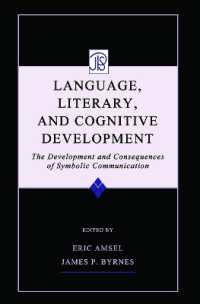- ホーム
- > 洋書
- > 英文書
- > Philosophy
Full Description
It is often asserted that postmodernism emerged from 'leftist' Nietzsche-interpretations, but this claim and its implications are rarely explored. Deconstructing Postmodernist Nietzscheanism investigates how Deleuze and Foucault read Nietzsche and apply a hermeneutics of innocence to his philosophy that erases the elitist, anti-democratic, and anti-socialist dimensions. In a clear and incisive analysis, Rehmann shows that this misreading also affects their own theory and impairs the ability to develop a radical critique from it. Thus the late Foucault's turn to self-care techniques merges a neo-Nietzschean approach with the ideologies of neoliberalism.
Rehmann's critique is not directed against the endeavor to take suggestions from some of Nietzsche's astute intuitions, but rather against the near universal tendency to use him as a symbolic capital without admitting his hierarchical obsession and other political flaws.
This book is an updated and extended version of Postmoderner Links-Nietzscheanismus: Deleuze and Foucault. Eine Dekonstruktion, originally published in German by Argument Verlag GmbH.
Contents
Introduction
Part I. Deleuze and the Construction of a Plural-Differential Image of Nietzsche
1. Plural Differences Instead of Dialectical Contradictions
2. Deleuze's Combination of Hume's Empiricism and Bergson's Vitalism
3. Nietzsche as Anti-Dialectician?
4. The Birth of the Postmodern 'Difference' out of the 'Pathos of Distance'
5. The Debate About the 'Will to Power': Metaphysical or Plural?
6. Nietzsche's Combination of Decentring and Hierarchisation
7. Flattening out the Late Nietzsche's Departure from Spinoza
8. The Confusion of Spinoza's Power to Act with Nietzsche's Power of Domination
9. Will to Power as Desire Production
10. Primitive Inscriptions and State-Imperial Overcodings
11. Faire de la pensée une machine de guerre
Part II. The Death of Man and the Eternal Recurrence
1. Survey of the Terrain: Uncritical Replication, Normative Critique, Leftist Helplessness
2. The 'Age of History' and the 'Anthropological Sleep'
3. Borrowings from Heidegger's Critique of Humanism
4. The Reductionist Construction of an 'Anthropological' Age
5. The Overcoming of Marxian Utopia by the Overman
6. Excursus: Nietzsche's Reworking of Cultural Protestant Anti-Judaism - the Example of Wellhausen
6.1 Wellhausen's Anti-Judaic Construction
6.2 Nietzsche's Adoption and Modification of Anti-Judaism
6.3 Anti-Semitism, Anti-Anti-Semitism - Revisiting a Stalled Debate
7. Nietzsche's Eternal Recurrence as Religion
8. Postmodern Reading of Nietzsche as Pious Retelling
Part III. The Introduction of a Neo-Nietzschean Concept of Power and Its Consequences
1. New Coordinates
2. Survey of the Terrain: The Overcoming of Ideology Critique through the 'Diversity' and the 'Productivity' of Power
3. The Dissolution of Ideology into 'Knowledge'
4. The Neo-Nietzschean Alternative: 'Everything is Fake'
5. Power as Dissimulation Machine
6. Nietzsche's 'Genealogy', or: the Violent Construction of an 'Alternative Nietzsche'
6.1 'Ursprung' versus 'Herkunft' with Nietzsche?
6.2. Points of Support for the Foucauldian Interpretation in the 'Middle' Nietzsche
6.3. The late Nietzsche's Verticalisation and its Suppression by Foucault
7. The Affiliation with Left-Wing Radicalism in Paris
8. The Enigmatic Issue of Power and its Anchorage in War
9. Outlook: The Suppression of the Structurally Anchored Power Relations
Part IV. From Prison to the Modern Soul - 'Discipline and Punish' Revisited
1. An (All Too) Cursory Meeting with 'Critical Theory'
2. The Socio-Historical Approach of Georg Rusche and Otto Kirchheimer
3. Advancement or Abandonment of a Social History of the Penitentiary System?
3.1. From Function to Aspects of Functioning
3.2. A Neo-Nietzschean Framework
3.3. The Abstraction from Forced Labour
3.4. A Narrowed-Down Genealogy of the Prison
3.5. Foucault's Elimination of Contradictions
3.6. The Fixation of Critique on the Social-Pedagogisation of the Penal System
3.7. Foucault's 'Dispositif' and the 'Political Economy' of the Body
4. The Panoptical Nucleus of the Disciplinary Society
4.1. The Panopticon as Diagram of Modern Hegemony?
4.2. The Levelling of Repressive and Consensual Socialisation
4.3. The Real-Imaginary of the Panopticon
4.4. 'Economy ought to be the prevalent consideration' (Bentham)
4.5. Bentham as Visionary of 'Disciplinary Neoliberalism'
5. Foucault's Disciplinary Power in a Double-Bind Between 'Microphysics' and Omnipresent 'Phagocytic Essence' (Poulantzas)
5.1. The Hidden Contradiction
5.2. The Diversity of Power and the Problem of its Accumulation
5.3. 'The Limits of Social Disciplining' (Peukert)
5.4. The Removal of the 'Topography' from the Theory of Society (Althusser)
6. Foucault's Metaphorisation of the Prison and the Reality of Neoliberal Hyperincarceration
Part V. Forays into the Late Foucault
1. Biopolitics — A New Power Enters the Stage
2. Foucault's Distinction Between Techniques of Domination and Techniques of the Self
3. The Mysterious Concept of 'Governmentality'
4. A Sharp Turn Against Socialism
5. Marx as Stalinism's 'Truth'
6. Foucault's Affiliation with Neoliberalism
6.1. Survey of the Terrain: Ambiguities and Opposite Interpretations
6.2. Foucault's Contribution to a Critical Analysis of Neoliberalism
6.3. Fascinated by Neoliberalism's 'Post-Disciplinary' Governmentality
6.4. The Assault on the Fordist Welfare State
6.5. Foucault's Self-Techniques as Part of a Neoliberal Transvaluation
Appendix: Governmentality Studies, or the Reproduction of Neoliberal Ideology
Bibliography
Name Index
Subject Index








